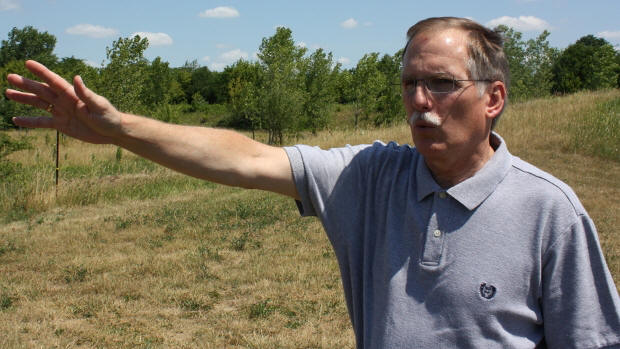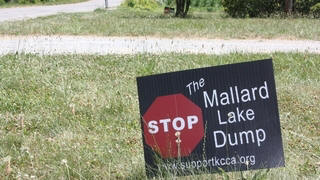Landfill battle drags on for more than three decades, still not over
- November 19, 2012
- By Jim Johnson
 Photos by Jim Johnson, Waste & Recycling News
Jeff Reed stands on Indiana land his
family still hopes to develop into a landfill as a battle with a
local opposition group continues after more than three decades.
Photos by Jim Johnson, Waste & Recycling News
Jeff Reed stands on Indiana land his
family still hopes to develop into a landfill as a battle with a
local opposition group continues after more than three decades.
 Signs opposing the proposed Mallard Lake landfill near Anderson,
Ind., can be seen along a road leading to land where the
disposal site could be located.
Signs opposing the proposed Mallard Lake landfill near Anderson,
Ind., can be seen along a road leading to land where the
disposal site could be located.
Anderson, Ind. – Jimmy Carter was still president, disco music was still holding on by a thread and the seeds were just being planted in what would become a 33-year battle to build a landfill.
The year was 1979.
More than three decades now have passed since Ralph Reed began the process to create the Mallard Lake landfill near Anderson, Ind., a move that would spark a battle for the ages where neither opponents nor proponents have been willing to give up the fight.
It's a battle where both sides express displeasure with local politicians and the local media, saying the other has received favoritism.
It's a battle where both sides questioned each other's financial dealings.
It's a battle that one side says might be coming to an end, but the other vows to continue waging.
The patch of land lies north of Anderson, a total of 260 acres that's been waiting to be developed for more than three decades. There once was a Mallard Lake landfill sign and even a scale house. But the sign is long gone and the scale house mysteriously burned down years ago.
What's left is a maintenance building constructed in the 1980s that's used by a farmer who rents the land these days. Trees have grown here and there on a 13-acre portion of the property that once was completely cleared in preparation to accept waste.
Time, in this story, is measured in decades; hope, by days.
"When everybody looks at us and says how can you take it, how can you stand it, we just did it one day at a time and kept our hope up. We never lost hope," said Kay Reed, Ralph Reed's widower. "I'd say that's probably the way we got through it."
Reed, who held true to his belief that the landfill was both legal and needed by the community, passed away in April at 84 leaving his wife and son to continue on with the proposal.
Make no mistake, the Mallard Lake landfill idea has been a controversial one over the years. Land for the disposal site is located near what is now a closed elementary school. And a long-time opposition group, Killbuck Concerned Citizens Association, has fought the site about seven miles northeast of Anderson at every turn.
"We believe so much in this community and what's best for this community that we will not stop," said Bill Kutschera, chairman of the group.
Talk to people on both sides of the issue long enough, and they will eventually mention somebody who had previously been involved but has since passed away. That's just the way it is when a conflict rages for more than 30 years.
Kutschera pointed to a former KCCA board member who was out putting fundraising candy displays at local businesses while he had stage four cancer. The man later died. "It's indicative of the commitment that this organization has made to protect the community. We'll just continue to do what we need to do," he said. "We will stop it."
But the Reed family believes now finally it has achieved victory after a recent state appeals court ruling, one of many, many court battles over the years.
"I'd have to say he was a fighter. If something came out in the paper he didn't think was right, he was right back at them," Kay Reed said about her late husband.
Jeff Reed was still a young man when his father decided to pursue development of the landfill. The family business, Reed Excavating, was in the middle of a 5-year contract to handle twice-weekly trash collection for the city of Anderson. Building a landfill just made sense to him as existing local disposal space was running out at the time.
Jeff is the "J" in JM Corp., the company founded by his father to develop the landfill. His brother Mark was much more involved in the project He, too, passed away a few years ago.
The company lost that hauling contract in 1983, but the elder Reed continued on with his landfill plans. "You have to know Ralph; he was the eternal optimist. He has always been optimistic, or was, that this was going to happen," JM Corp. attorney Ronald K. Fowler said.
Fowler estimated the family has about $5 million tied up in the project over the years and is tapped out financially.
With the door seemingly now open to resume development of the site thanks to the recent court ruling, the Reed family is hoping to attract a business partner with deeper pockets.
"We just owe a lot of money to a lot of people and if we don't get it open, there's going to be a lot of people hurt financially," Kay Reed said. "Everything we've got we've socked into it."
Money has been borrowed from friends and family alike. Ralph Reed didn't have an insurance policy when he passed away because he cashed it in for the money. "Everything's to the hilt," Kay Reed said.
While the KCCA has been a prominent face in the battle against the landfill, Fowler squarely places blame at the feet of another group.
"It's the politicians that have caused all the problems to buy a few votes," he said. "The politicians have always been the ones that have caused extra administrative problems for it. And then they fall back on the KCCA for the reason for doing this."
Jeff Reed called it a "sad state of affairs" when it takes more than 30 years to open "a legal business in this community."
Kutschera, meanwhile, believes his group also has been let down by local politicians over the years. "The most frustrating thing is we are not getting any support from the county officials who have a sworn responsibility to protect the citizens," the KCCA chairman said.
Larry Whitham is an Indianapolis zoning and land use attorney who works with KCCA.
"It's taken a lot of twists and turns over the years," he said. "I guess every one is probably unique in its way. This one is unique in its own and probably extremely unusual."
The latest court ruling – Kutschera said his group has battled Mallard Lake in court 13 or 14 times over the years – has the group looking to take a different approach.
Instead of trying to continue the battle in the courts, he said KCCA is looking to return to the political process in its attempts to block the landfill's development.
It's a battle that the community group has waged aggressively over time, Whitham said. "They have stayed on message, on point, and frankly, I think they have a good case to be made."
"I continue to believe, as I have believed for years, this is a very, very bad use of this particular land within Madison County," Whitham said.
While the sheer length of time the two sides have fought over the landfill is astonishing, the issues being raised are fairly common in landfill battles.
KCCA members harbor concerns about groundwater contamination they allege could harm Anderson's water supply and the impact landfill operations could have on the local municipal airport.
Fowler brushes aside the talk of water contamination as groundless and said the airport issue is essentially a red herring.
Jeff Reed, who went on to become a commercial pilot after his stint collecting trash, is now 59 and has always believed the landfill eventually would be built.
"I always had hope, but I also had a family and two young kids and I had to go elsewhere to make my living. But I never lost hope," Jeff Reed said.
He also knew there would be obstacles. "I could see that this was going to be a long, drawn-out process. It wasn't going to be as easy as we had originally thought," he said.
At some point, with so much invested in the project by the family and so much money owed to other people, it was too late for Ralph Reed to turn back, his widower said.
"He always said it was like having a tiger by the tail. You just can't let it go," Kay Reed said.
Kutschera, meanwhile, said determination has helped his organization stay active for all these years to oppose the landfill.
"It started with a group of folks, many of whom have passed," he said. "We're an army of soldiers and we have recruits and we just keep going because of the spirit of what we represent, and that is what's best for this community that we dearly love.
"The commitment is there. I may be dead tomorrow, I got a bad heart, and I know that there's going to be somebody else who is going to take my place," Kutschera said.
![]()
w w w . w a s t e r e c y c l i n g n e w s . c o m
copyright 2012 by Crain Communications Inc. All rights reserved.